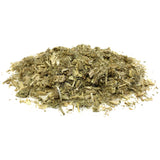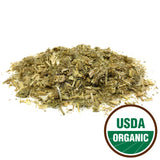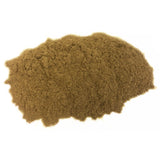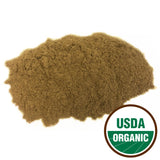Blessed Thistle Herb is an herbaceous plant, 2 feet high. It is reddish, slender, much branched and unable to keep upright with the weight of its leaves and flower heads. The long, narrow leaves have prominent pale veins with irregular teeth ending in spines that clasp the dull green stem. Flowers are pale yellow. Subtending the flower heads are green scales tipped with a long, brown bristle. The whole plant, including leaves, stalks and flower heads are covered with a thin down. Cultivated in the U.S., occurring in waste places when escaped.
UPC: 084783001195.
Origin(s): Bulgaria, Croatia, Germany, Hungary, Poland, United States, Vietnam.
Latin Name(s): Cnicus benedictus.
Also known as: Holy Thistle, Saint Benedict thistle, spotted thistle, bitter thistle, blessed cardus.
Plant Part(s) Used: Herb, Aerial parts.
Appearance: Light green, greenish brown, tan with a wood texture.
Aroma: Slightly leafy, pleasant, reminiscent of parsley.
Taste: Bitter, slightly astringent.
GMO Status: Non-GMO.
Allergen: None.
Additives: Free of any additives or preservatives.
Applications / Preparations: Can be put into capsules, teas, flavor alcoholic beverages or infused as an herbal extract. For cosmetic use various topical preparations for troubled skin.
Storage: Store in a sealed container in a cool, dry place.
Shelf Life: It is very difficult to pin down an exact expiration date for most single herbs as they do not really expire, they lose potency or strength over time but will still have value. Unlike synthetic material or drugs, herbs can contain many constituents that contribute to their medicinal effects. Even if when we know what the active constituents are, there are often many of them in a single herb, each with different rates of degradation. Some herbs lose their effect more easily. Other herbs that possess more stable compounds such as alkaloids or steroids will last much longer.
A huge part of the degradation rate of herbs depends also on the storage conditions of the herb, & even on the quality of the herb before storage – how it was grown, harvested, dried & processed. If the product is left in hot places or open to sunlight then it will degrade much quicker than if it was stored in cool, dry place & sealed tightly.
A good rule of thumb is that herbs should be stored no longer than 2-3 years but many herbs will have great strength much longer than that. To determine if a an herb is still good you can check the appearance & aroma. Herbs that are no longer acceptable will have lost much of its vibrant color & will instead appear dull & faded. The bigger key though is to smell the raw materials to see if the potent aroma is still present.
Warning: Persons with allergies to other members of the Asteraceae family (such as feverfew, chamomile, or Echinacea species) should exercise caution with Blessed Thistle as allergic cross-reactivity to Asteraceae plants is common.








